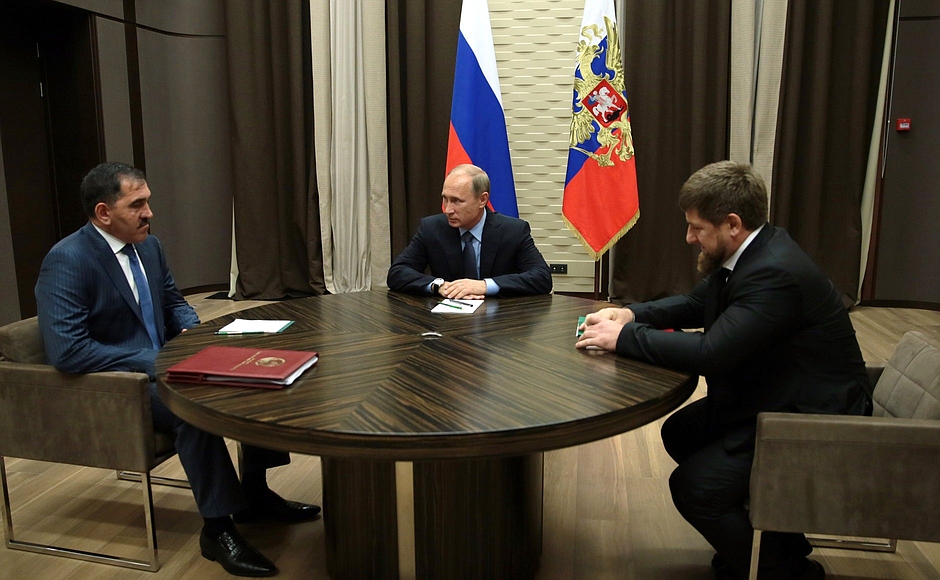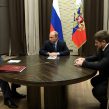
Does Moscow Have Plans for ‘Soft’ Merger of Chechnya and Ingushetia?
Publication: Eurasia Daily Monitor Volume: 12 Issue: 169
By:

On September 14, President Vladimir Putin arrived in Ingushetia on an unannounced visit and convened a government meeting in the capital, Magas (Kremlin.ru, September 14). Three days later, on September 17, the Russian president held another meeting in a highly unusual format—with the governor of Ingushetia, Yunus-Bek Yevkurov, and the governor of Chechnya, Ramzan Kadyrov. Moreover, the three men were shown on the official Kremlin webpage sitting together at a round table (Kremlin.ru, September 17). Vladimir Putin’s highly unusual attention to Ingushetia and Chechnya at a time when he has many other pressing issues on his plate, such as preparing for his speech to the United Nations General Assembly, sparked widespread speculation among experts about the true meaning of Putin’s visit.
Indeed, the Kremlin gave no information about the meeting between Putin, Yevkurov and Kadyrov at the Russian president’s residence in Sochi other than that it involved a discussion of “various projects of economic development of the North Caucasus region, including the implementation of programs” (Kremlin.ru, September 17). Nor were there any special statements made at the Magas meeting that would explain why the Russian head of state decided to visit a small republic that has largely stayed out of the news in the past couple of months. In the Magas meeting, Putin noted that Ingushetia remains highly dependent on Moscow for its financial wellbeing. The president especially highlighted issues related to high unemployment and poor housing conditions in the republic (Kremlin.ru, September 14). These issues in Ingushetia are not new and have not caused particular problems for the government, so they do not explain Putin’s visit to the region.
This development caught the attention of several Ingush bloggers, who immediately speculated that Moscow is possibly planning to merge Ingushetia and Chechnya into one republic (Livejournal.com, September 17). Checheno-Ingushetia existed during the Soviet period, but for tactical political reasons, Moscow approved Ingushetia’s separation from the joint republic in 1992, when Chechnya sought independence from the Russian Federation. The Chechens and Ingush are closely related ethnic groups, who speak a language that is mutually intelligible and are sometimes referred to collectively as the Vainakh people. At the same time, they have differences that resulted in clashes in recent years after Chechnya’s flamboyant and authoritarian ruler, Ramzan Kadyrov, sought to expand his rule to Ingushetia. Russian experts warn that the Ingush will not tolerate the patronizing tone of their larger and more influential ethnic cousins, the Chechens, and that Moscow should not attempt to merge the two republics (Kavkazskaya Politika, September 19).
Relations between Yevkurov and Kadyrov soured back in 2012, when Kadyrov claimed that his men killed several insurgents who had attacked Tsentoroi, Kadyrov’s clan in Chechnya. Kadyrov accused the Ingushetian authorities of being incapable of fighting the militants and offered his assistance. Yevkurov responded by criticizing Kadyrov’s methods of fighting the insurgency in Chechnya. The conflict quickly spiraled into personal attacks by the two leaders, and Kadyrov subsequently pushed for the establishment of a proper administrative border between the two republics. Since the two peoples have lived alongside each other for a long time, border issues could have easily further deteriorated relations between Ingushetia and Chechnya. However, Moscow intervened and pacified the two leaders for a while (Kavkazskaya Politika, September 17).
The “truce” broke down in August 2014, when Chechen and Ingush police clashed at the border. Last August, an official Chechen delegation visited the Ingush city of Karabulak to convince the remaining refugees to return to Chechnya. The visit was overshadowed by confrontation with the Ingush authorities that nearly ended in another clash. Ingushetia’s Minister for External Ties, Nationalities, Press and Information Ruslan Khautiev called the Chechens a “so-called brotherly people” and claimed that the Chechen Republic had only produced terrorism in recent years, while Ingushetia had managed “to overcome this.” Chechen authorities have recently started to distribute aid among needy Ingush, further infuriating the Ingush authorities. Given the history of rocky relations between the Chechens and the Ingush, some analysts regarded the meeting between Putin, Kadyrov and Yevkurov as Moscow’s attempt to make peace between the two neighboring republics (Kavkazskaya Politika, September 17).
However, no vows of eternal friendship between the two people followed the three-way meeting, so it is not clear whether the meeting was about making peace between Kadyrov and Yevkurov. Putin’s spokesman Dmitry Peskov denied that the president’s intention was to mediate between the two governors. Peskov said the meeting was only about economic issues (RIA Novosti, September 17).
Several experts agree that Putin convened the meeting with the governors of Chechnya and Ingushetia to use the Chechen experience of economic development in Ingushetia (Club-rf.ru, September 18). If so, this implies Putin could be trying to push for the expansion of Kadyrov’s influence in Ingushetia. Improving economic conditions is apparently the Russian government’s stated rationale and, at the same time, the bait for the Ingush public. Even if Kadyrov does not obtain formal control over Ingushetia, Moscow appears to approve of his ambitions vis-à-vis Ingushetia. Many in Ingushetia, however, are likely to be upset about this decision, which may contribute to further friction with Chechnya.




